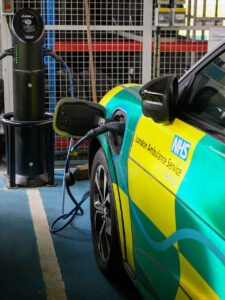NHS to save up to £130 million through new electric vehicle chargers on NHS sites
Did you know the NHS runs the second-largest vehicle fleet in the country — just behind Royal Mail? With over 20,000 vehicles clocking up more than 460 million miles each year, our fleet plays a vital role in delivering NHS services. From ambulances and patient transport to maintenance and essential deliveries, these vehicles help keep the health service moving.
But while our fleet is essential, it also comes with a cost: air pollution. Every year, pollution contributes to around 36,000 deaths in the UK, affecting the most vulnerable in our communities — people with existing health conditions, older adults, and children. That’s why the NHS is committed to transitioning to a fully decarbonised fleet by 2040.
It’s a big challenge — and one we can’t tackle alone. So, we are hugely encouraged by the government’s recent announcement of a £63 million investment in electric vehicle infrastructure. This funding will help cut charging costs, support ownership, and accelerate the shift to cleaner, greener transport across the UK.
 As part of this, the NHS will receive £8 million to support our own fleet’s decarbonisation. By investing in electric chargepoints across NHS sites, we’ll reduce fuel and maintenance costs — savings that can be redirected straight back into frontline care.
As part of this, the NHS will receive £8 million to support our own fleet’s decarbonisation. By investing in electric chargepoints across NHS sites, we’ll reduce fuel and maintenance costs — savings that can be redirected straight back into frontline care.
Thanks to the dedication of teams across the country, the NHS has already delivered hundreds of innovative projects that cut emissions, improve patient care, and save money. Now, this latest investment — spanning 62 NHS trusts and around 224 sites — is expected to save the NHS £130 million over the next 25 years, with a return on investment in just 4 years.
Tracy Nicholls, Chief Executive, The College of Paramedics, said: “The College of Paramedics warmly welcomes the government’s funding agreement to fund over 1,200 new EV chargers at NHS sites. This is a vital step forward in supporting ambulance services to operate more sustainably, in line with our commitment as members of the UK Health Alliance on Climate Change and our collective focus on meaningful change to reduce the impact of air pollution on our patients and communities. By supporting ambulance services to move to electric vehicles, we not only reduce emissions and improve air quality, but also save money. We urge the government to maintain this funding long-term to ensure the UK ambulance sector can continue its essential transition to greener, more sustainable fleets”.
Anna Parry, Managing Director of the Association of Ambulance Chief Executives (AACE), said: “This £3.5 million investment in electric vehicle chargepoints across all ten NHS ambulance trusts is a timely and positive step toward a more sustainable NHS, as outlined in the government’s 10-Year Health Plan.
“In some parts of the country electric ambulances and response cars have already been successfully tried and tested, showing how transitioning the ambulance fleet to electric vehicles could significantly reduce exposure to air pollution for patients and communities, while also offering long-term savings that can be reinvested to enhance patient care”.
This is a major step forward and demonstrates the renewed commitment in the government’s 10 Year Health Plan to deliver a more sustainable NHS. By supporting the transition to electric vehicles, we are not only protecting the health of our patients and communities — we’re also making sure more of our resources go where they matter most: caring for our patients and protecting our communities.
Read more: New £63 million boost for Britain’s electric vehicle revolution
See a list of NHS trusts that are receiving funding to install electric vehicle chargepoints
